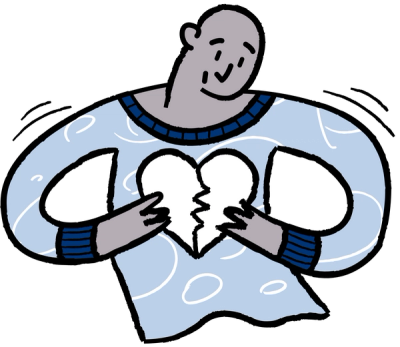Understanding suicide
Also in this topic:
Suicide is a tragic death which occurs when a person voluntarily and intentionally ends their own life. There are different reasons why someone might think about ending their life, but it usually happens when:
- the emotional pain they are experiencing feels unbearable
- they feel like they don't belong in this world
- they feel like they're a burden on the people around them
- they don't see another way to solve their problems.
It's a common misconception that suicidal thoughts only affect a small minority of people. They can affect anyone at any point in their life.
If you have ever experienced thoughts of suicide, you are not alone. In fact, 1 in every 6 Australians has seriously thought about taking their own life on at least one occasion.
“I lost my identity to my illness, and when that occurred, it felt like I had lost everything, so suicide seemed like a viable option.”
No matter how hopeless you feel, we are here for you. At Lifeline, we have supported many Australians who have experienced suicidal thoughts and/or behaviours. If you’re experiencing any of these right now, remember Lifeline is here for you or if life is in danger, call 000.
What are suicidal thoughts and behaviours?
Suicidal thoughts and behaviours include any thoughts, ideas, plans or actual attempts to end one’s own life, and if you are experiencing them, it can be incredibly scary, lonely, and overwhelming.
Suicidal thoughts and behaviours can show up differently in different people.
You may think about suicide everyday, someone else might think about it every couple of months, and someone else may only ever think about it once or twice.
You may have openly talked about your suicidality with loved ones, or you may have never expressed it to anybody.
While the themes of suicide-related thoughts and behaviours may have similarities, no two people will have the exact same experience.
Who do suicidal thoughts and behaviours affect?
Anyone can be affected by suicidal thoughts and behaviours at any time.
It's a common misconception that only people experiencing mental illness think about suicide. In fact, roughly half of the people who die by suicide were not being treated for mental health issues when they died.
Equally, many people who experience mental health issues are not affected by suicidal thoughts.
The truth is we are still learning more about suicidal thoughts, who they affect, and why. What we do know is that certain 'risk factors' make it more likely for someone to have these thoughts. Risk factors can include things like financial stress, trauma, relationship problems, and many others.
You can read about some of the other causes and risk factors for suicide here, and about warning signs here.
How common are suicidal feelings and thoughts?
Feeling suicidal can be an isolating experience, and you may feel like you’re the only one who struggles with thoughts about ending your life. The truth is, many people have similar thoughts, even if they don't talk about it. Here are some facts about how common suicidal thoughts and behaviours are in Australia:
- On average, 9 Australians die by suicide every day
- Over 3,300 Australians die by suicide each year
- Suicide is the leading cause of death for Australians aged 15 - 44
- On average, 400,000 Australians experience suicidal thoughts per year
- Over 62,000 Australians attempt suicide each year
- At least 35,000 Australians are admitted to hospital for suicide-related injuries and crises each year.
‘Suicidality’ is a term that is used to refer to thoughts, feelings and behaviours related to suicide. It includes a range of experiences, from occasionally thinking about wanting to die, to concrete plans for ending your life. All suicidal thoughts, feelings and behaviours should be taken seriously. If you’re feeling suicidal, Lifeline is here for you, or if life is in danger, call 000.
Download our factsheets:





